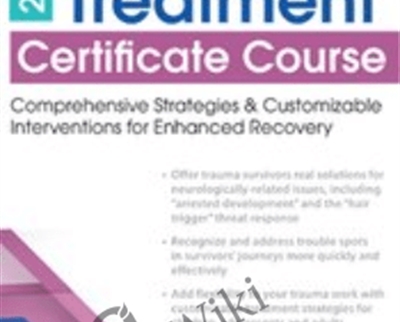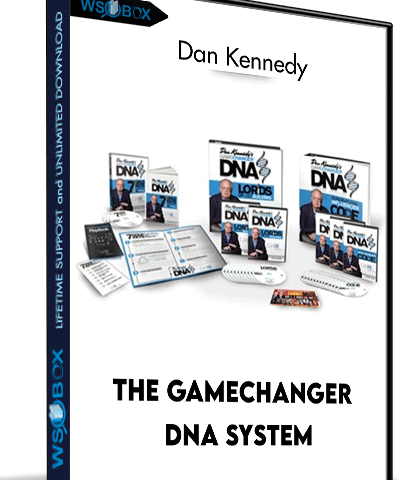2-Day: Trauma Treatment Certificate Course: Comprehensive Strategies and Customizable Interventions for Enhanced Recovery – Robert Lusk
$196.00
12 Hours 26 Minutes
I looked for a solution, and discovered it in an integration of neuroscience, physiology, the three stages of trauma recovery, smaller ingredients taken from larger evidence-based models, and customizable treatment strategies that addressed unique needs of trauma survivors and their families.
Description
Purchase 2-Day: Trauma Treatment Certificate Course: Comprehensive Strategies and Customizable Interventions for Enhanced Recovery – Robert Lusk Course at eBokly. We actively participate in group buys and are committed to sharing knowledge with a wider audience. What's more, our courses maintain the same quality as the original sale page. You have the option to buy directly from the sale page at the full price (sale page link is provided within the post).
Like you, I’ve dealt with some major obstacles to providing effective trauma treatment during my career. How do I make the best use of the growing body of neuroscience research? How can I cut through the clutter of all the possible factors contributing to the trauma and get a clear picture of the issues to address in therapy? How can I tailor my approach to meet the unique needs of each survivor?
I looked for a solution, and discovered it in an integration of neuroscience, physiology, the three stages of trauma recovery, smaller ingredients taken from larger evidence-based models, and customizable treatment strategies that addressed unique needs of trauma survivors and their families.
This certificate course recording presents this integrated and customizable approach to trauma treatment in a manner that is easy to follow and readily adaptable to a variety of settings.
You will discover how to use this integrated model as a foundation upon which you can then tailor and apply treatment approaches with which you are already familiar but until now seemed rigid and inflexible. You will be able to move beyond the standard script often given for when and how to apply various strategies, allowing you to focus much more intently on where the trouble spots are in each survivor’s life and what actions to take to resolve them. You will get a road map that will help you to guide each survivor through all the stages in the trauma recovery process.
In this exciting, innovative, and evidence-informed training, you'll leave invigorated, with a new plan of action for how to use standard models and strategies in new ways to facilitate meaningful and lasting trauma recovery.
- Identify the strategies to avoid common pitfalls clinicians may encounter when formulating a trauma diagnosis.
- Explain the impact of trauma on the brain and behavior for the purpose of client psychoeducation.
- Analyze how to resolve the disconnect that sometimes exists between evidence-based treatments and the real lives of survivors.
- Determine the process for applying psychological first aid to ensure safety for clients who have experienced trauma.
- Apply a flexible conceptual framework to trauma treatment that is sensitive to clients’ needs across several critical domains.
- Utilize strategies to assist caregivers of young trauma clients with issues of emotional control, attunement, and discipline.
- Implement a variety of treatment exercises and grounding techniques to help clients develop emotional regulation skills.
- Integrate cognitive behavioral strategies to transition problematic thoughts of clients into more adaptive, helpful thinking patterns.
- Evaluate the effectiveness of various trauma treatment strategies used through the three stages of trauma recovery.
- Incorporate play-based and verbal techniques to assist clients in developing their trauma narrative.
- Choose appropriate strategies to help clients prepare for future safety issues and trauma triggers.
- Create a treatment plan for building resiliency in clients to facilitate posttraumatic growth and meaningful recovery.
Get 2-Day: Trauma Treatment Certificate Course: Comprehensive Strategies and Customizable Interventions for Enhanced Recovery of author Robert Lusk only price 119$
Trauma Impact: Summary of the Research
- Definitions & concepts
- Short term and long term effects (the ACE study)
- The “good” and “bad” news about trauma exposure
- Limitations of the research
Assessment and Diagnosis of Trauma
- Assessment of trauma in children, adolescents and adults
- Trauma-& Stressor-Related Disorders in the DSM-5
- What’s still missing from the DSM-5®?
- Common pitfalls in diagnosis
- My “favorite” diagnosis & why to use it frequently
Address Trauma’s Impact on Neurobiology
- Major areas of impact
- The 3-part brain (or upstairs/downstairs brain)
- Neurologically-related issues in trauma survivors
- ”Arrested Development”
- ”Hair Trigger” threat response
- Cognitive, academic, & work-related problems
- Relationship problems
- The arousal continuum
- Dissociation
Evidence-based Treatments vs. the “Real World”
- What does “evidence-based” mean in trauma treatment?
- Components of evidence-based treatments
- The evidence-based components approach
Points of Intervention in Trauma Treatment
- Main entry points: immediate support vs. trauma treatment
- Psychological first aid
- Stages of trauma-focused treatment
- What can you do if your client isn’t emotionally or physically safe?
- Trauma-Focused Cognitive-Behavioral Therapy: The “Gold Standard”
- Case examples
- ”Amanda”: 7-year-old girl with sexual abuse and complex family issues
- ”Phil”: mid-30s man whose son died while in his care
Address Critical Domains in Trauma Treatment
- The Physiology Domain
- Sleep
- Nutrition and hydration
- Sensory needs and interventions
- Medications, supplements, & nontraditional interventions
- Physical activity/exercise
- ”Amanda” and “Phil” and the physiology domain
- The Relationship Domain
- The Attachment, Regulation, & Competency (ARC) model (for youth)
- Teaching caregiver emotional control (for caregivers of youth)
- Build attunement (for caregivers of youth)
- Positive discipline (for caregivers of youth)
- Build the therapeutic alliance
- Build a support network
- Implement routines & rituals
- ”Amanda” and the relationship/attachment domain
- ”Phil” and the relationship domain
- The Emotional Regulation Domain
- Feelings identification and expression
- Use SUDs scales
- Grounding & self-soothing techniques
- The “Comfort Kit”
- Add attunement!
- Apply Bruce Perry’s Neurosequential Model of Therapeutics™
- NMT assessments
- NMT: Interventions by developing age
- ”Amanda” and “Phil” and the emotional regulation domain
- The Cognitive Domain
- Teach and practice problem-solving
- Teach and practice mindfulness
- Address distorted cognitions: Most common targets of cognitive processing
- Cognitive processing: how to modify problematic thoughts
- Use the Franklin Method
- ”Amanda” and “Phil” and the Cognitive Domain
- The Identity Domain
- Focus on identity and sense of self
- Build on existing strengths
- The Life Book approach
- Exercises to improve identity
- ”Amanda” and “Phil” and the identity domain
Additional Components for the 3 Stages of Trauma Recovery
- Stage One: Safety & Stabilization
- Establish rapport
- Education of the client about effect of trauma
- Safety plans
- Trauma-specific areas of focus
- Sexual abuse for “Amanda”
- Triggers for “Phil”
- Stage Two: Process the Past Trauma
- Preparation
- Create the trauma narrative
- Play and verbal-based methods of creating the trauma narrative
- Process of constructing a trauma narrative
- When is your client finished with Stage Two?
- Process “Amanda’s” trauma (play therapy “narrative”
- Process “Phil’s” trauma (verbal narrative)
- Stage Three: Reconnection:
- Consolidate/internalize coping skills
- Enhance positive emotions
- Making meaning of the trauma
- Facilitate reconnection to daily activities
- Enhance current relationships
- Prepare for future safety and triggers
- Posttraumatic growth
- Reconnection for “Amanda” and “Phil”
Resiliency and Protective Factors
- Research on resiliency and protective factors
- The top protective factors for trauma
- Build resiliency
Get 2-Day: Trauma Treatment Certificate Course: Comprehensive Strategies and Customizable Interventions for Enhanced Recovery of author Robert Lusk only price 119$
Tag: 2-Day: Trauma Treatment Certificate Course: Comprehensive Strategies and Customizable Interventions for Enhanced Recovery – Robert Lusk Review. 2-Day: Trauma Treatment Certificate Course: Comprehensive Strategies and Customizable Interventions for Enhanced Recovery – Robert Lusk download. 2-Day: Trauma Treatment Certificate Course: Comprehensive Strategies and Customizable Interventions for Enhanced Recovery – Robert Lusk discount.
Purchase the 2-Day: Trauma Treatment Certificate Course: Comprehensive Strategies and Customizable Interventions for Enhanced Recovery – Robert Lusk course at the best price at eBokly. Upon completing your purchase, you will gain access to the downloads page. where you can conveniently retrieve all associated course files. Additionally, we will send you a download notification email to your registered mail.
Unlock your full potential with our 2-Day: Trauma Treatment Certificate Course: Comprehensive Strategies and Customizable Interventions for Enhanced Recovery – Robert Lusk courses. Our courses are meticulously designed to empower you with the skills and knowledge needed for excellence.
Why wait? Take the first step towards greatness by acquiring our 2-Day: Trauma Treatment Certificate Course: Comprehensive Strategies and Customizable Interventions for Enhanced Recovery – Robert Lusk courses today. We ensure a smooth and secure purchasing experience that guarantees your peace of mind. Rest assured that your financial information is safeguarded through our trusted payment gateways, Stripe and PayPal.
Stripe, renowned for its robust security measures, offers a secure and dependable payment process. Your sensitive data is encrypted using state-of-the-art technology, ensuring its confidentiality throughout the transaction.
PayPal, a globally recognized payment platform, adds an extra layer of security. With its buyer protection program, you can make your purchase with confidence, knowing that your financial details are protected, allowing you to focus on your learning journey.
Is it secure? to Use of?
- Rest assured, your identity remains completely confidential. We do not share your information with anyone, ensuring the utmost security when you buy the 2-Day: Trauma Treatment Certificate Course: Comprehensive Strategies and Customizable Interventions for Enhanced Recovery – Robert Lusk course.
- 100% Safe Checkout Privateness coverage
- We employ robust communication and encryption methods to protect sensitive information. All card numbers are encrypted using AES at rest-256, and the transmission of card numbers occurs in a separate hosting environment, without sharing or storing any data.
How Will the Course Be Delivered?
- Upon successful payment for the “2-Day: Trauma Treatment Certificate Course: Comprehensive Strategies and Customizable Interventions for Enhanced Recovery – Robert Lusk course”, Most of the products will come to you immediately. But for some products were posted for offer. Please wait for our response, it might take a few hours due to the time zone difference.
- If this occurs, kindly be patient. Our technical department will process the link shortly, and you will receive notifications directly via email. Your patience is greatly appreciated.
What Shipping Methods Are Available?
- You will receive a download link in the invoice or in YOUR ACCOUNT.
- The course link is always accessible. Simply log in to your account to download the 2-Day: Trauma Treatment Certificate Course: Comprehensive Strategies and Customizable Interventions for Enhanced Recovery – Robert Lusk course whenever you need.
- You can study online or download the content for better results, making it accessible from any device. Ensure your system does not go to sleep during the download process..
How Do I Track Order?
- We promptly update the status of your order following your payment. If, after 7 days, there is no download link provided, the system will automatically process a refund..
- We love to hear from you. Please don’t hesitate to email us with any comments, questions and suggestions.
You must be logged in to post a review.

 Purchase this course you will earn
Purchase this course you will earn 




Reviews
There are no reviews yet.